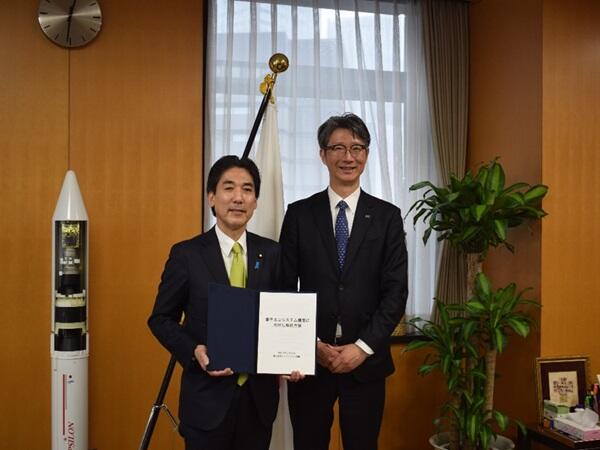Japan has three government strategies related to quantum technology, and by supplementing these and building a quantum ecosystem, the social implementation of quantum technology will advance. The government's Quantum Technology Innovation Council (Chair: Kohei M. Itoh, President of Keio University) has compiled promotional measures for building a quantum ecosystem, which were presented to Minoru Kiuchi, Minister of State for Science and Technology Policy, on May 30th by Deputy Chair Taro Shimada (Chair of the Quantum STrategic industry Alliance for Revolution "Q-STAR").
Kiuchi stated, "When Prime Minister Ishiba attended the opening ceremony of G-QuAT (the Global Research and Development Center for Business by Quantum-AI technology) at the National Institute of Advanced Industrial Science and Technology, he strongly emphasized strengthening the quantum strategy. I recognize that creating the proposed use cases is extremely important to ensure that Japan maintains and strengthens its competitiveness in this field, and I would like to reflect the content of these promotional measures in the Integrated Innovation Strategy 2025 and connect them to budget acquisition."

Countries around the world are strengthening their efforts toward research, development, and industrialization relating to quantum technology. In the United States, the DOE has formulated a quantum computer commercialization strategy, and established divisions for quantum sensing and measurement at NIST and a quantum laboratory at NASA. A total budget of $2.7 billion (approximately 405 billion yen) will be invested over five years until 2029. In the United Kingdom, £2.5 billion (approximately 475 billion yen) will be invested over 10 years starting from 2024, aiming to attract £1 billion in private investment. Last November, the government announced a £500 million budget increase to support science and technology industries, including the quantum field. It has presented five missions related to quantum technology implementation, targeting the 2030s. Germany has also announced a cross-ministerial plan for 2023-2026, allocating approximately €3 billion (480 billion yen) over four years.
The Japanese government has invested approximately 330 billion yen over the past five years, and multiple types of quantum computers have been introduced at G-QuAT, establishing a test bed environment combined with HPC. Japan has formulated three strategies: the "Quantum Technology and Innovation Strategy " for research and development, the "Vision of Quantum Future Society" for social transformation, and the "Strategy of Quantum Future Industry Development" aimed at practical application and industrialization, strengthening these efforts. Now, to accelerate social implementation, the promotional measures have been compiled.
Shimada stated, "Japan has demonstrated international competitiveness by providing high-performance, high-quality products through a vertically integrated ecosystem. However, we have fallen behind the world by failing to adapt to the horizontal division of labor and platform-based ecosystem of the digital age. To avoid repeating the same mistakes, these promotional measures propose initiatives for forming an ecosystem. For example, while quantum technology has aspects that haven't yet been implemented in society, once people try using the technology and find it to be good, it will spread rapidly. We are creating use cases to establish de facto standards while also advancing efforts to lead international standardization."
The promotional measures aim to build the target quantum ecosystem by enhancing market predictability; developing human, material, and financial resources; and establishing mechanisms for sustainable development.
For quantum human resource development, a base for talent will be expanded through various projects while establishing an educational environment for this purpose. The global value of Japan's research and development environment and market will be enhanced to strengthen international expansion capabilities and will be actively promoted overseas.
To build strategic bases that will support a foundation for quantum technology implementation and international competitiveness, the measures advance the expansion of test bed environments, construction of user-friendly utilization systems, support for domestic production of critical components and materials, international cooperation for stable supply, and analysis of choke points. In addition to basic research, development aimed at achieving low costs and coordination between layers will be promoted. The measures also support the formulation of standardization strategies, including human resource development based on roadmaps, and activities at ISO and ITU-T.
To ensure sustainable funding circulation and market creation that will support the quantum ecosystem, new use cases will be created through test bed expansion and promotion activities, and benchmarks for evaluating hardware performance to provide feedback to vendors will be established. Quantum incubation programs by VCs and support measures such as government procurement will be considered.
In response to these recommendations, the government will allocate the necessary budget in next fiscal year 's budget request and accelerate the strengthening of systems and collaboration among the 12 quantum technology innovation centers.
This article has been translated by JST with permission from The Science News Ltd. (https://sci-news.co.jp/). Unauthorized reproduction of the article and photographs is prohibited.




